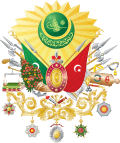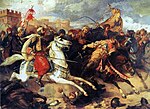Kapıkulu (Ottoman Turkish: قپوقولی اوجاغی, Kapıkulu Ocağı, "Slaves of the Sublime Porte") was the collective name for the household division of the Ottoman...
1 KB (128 words) - 22:43, 18 November 2024
Six Divisions of Cavalry (redirect from Kapıkulu Süvarileri)
Six Divisions of Cavalry (Turkish: Altı Bölük Halkı), also known as the Kapıkulu Süvarileri ("Household Slave Cavalry"), was a corps of elite cavalry soldiers...
2 KB (191 words) - 08:56, 1 November 2024
were known as the kapıkulu; these were Janissaries that had been sent on direct order from the Ottoman Sultan. In general, the kapıkulu were far more loyal...
2 KB (192 words) - 18:06, 25 March 2022
Sipahi (section Kapikulu Sipahis)
(timariots) which consisted most of the Ottoman army, and salaried, regular kapıkulu sipahi (sipahi of the Porte), which constituted the cavalry part of the...
21 KB (2,610 words) - 13:54, 31 October 2024
organization introduced by Mehmed II was twofold, central (Ottoman Turkish: Kapıkulu, the household division) and peripheral (Ottoman Turkish: Eyalet, province-level)...
42 KB (5,055 words) - 06:33, 10 November 2024
developed personal troops to be loyal to him, with a slave army called the Kapıkulu. The new force was built by taking Christian children from newly conquered...
161 KB (14,811 words) - 21:12, 24 November 2024
power. In 1826, he orchestrated the Auspicious Incident, in which the Kapıkulu were forcibly abolished and many of its members executed, paving the way...
44 KB (5,471 words) - 16:31, 6 November 2024
A. Kapıkulu (household) Army 78,500 Janissary and cebeci (weaponeer) and gunner 60,000 Sipâh (Kapıkulu) (household cavalry) 15,000 Mısır Kulu (Mamluks)...
64 KB (6,355 words) - 15:37, 20 November 2024
army consisted of the following: The Sultan's household troops, called Kapıkulu, which were salaried, most notable being Janissary corps. Provincial soldiers...
9 KB (915 words) - 16:11, 8 November 2024
cavalry levied in Europe, 17,000 Sipahis recruited from Anatolia, and 3,000 Kapikulu (regular body-guard cavalry). During the 18th century however the Ottoman...
145 KB (18,123 words) - 10:17, 20 November 2024
Janissary corps in 15th century. The Janissaries were kapıkulları (sing. kapıkulu), "door servants" or "slaves of the Porte", neither freemen nor ordinary...
57 KB (6,454 words) - 20:01, 24 November 2024
brought up as Muslims, and enlisted into the most famous branch of the kapıkulu, the Janissaries, a special soldier class of the Ottoman army that became...
282 KB (32,731 words) - 16:52, 13 November 2024
were seen as irregular militia, they did not have regular salaries as kapikulu soldiers, or fiefs like timarli soldiers; their only income was the booty...
8 KB (957 words) - 12:09, 20 November 2024
converted kapıkulu as his personal troops, independent of the regular army." This elite force, which served the Ottoman Sultan directly, was called Kapıkulu Ocağı...
63 KB (8,008 words) - 11:58, 17 November 2024
Empire, the word qul was used in rank names of the Janissaries such as kapıkulu and kul kethüdâsı. Abd (Arabic) Ghulam "Kul". TDV İslâm Ansiklopedisi (in...
3 KB (195 words) - 14:01, 17 October 2024
of troops began as well — artillery divisions and court cavalry, called Kapıkulu Süvarileri ("Household Slave Cavalry") — Six Divisions of Cavalry. In times...
2 KB (314 words) - 09:14, 9 November 2024
series on the Military of the Ottoman Empire Classical army (1451–1826) Kapıkulu Janissaries Six Divisions of Cavalry Sipahi Voynuks Yamaks Dervendjis Sekban...
6 KB (630 words) - 23:53, 10 November 2024
Ottoman military reforms (section Kapikulu)
series on the Military of the Ottoman Empire Classical army (1451–1826) Kapıkulu Janissaries Six Divisions of Cavalry Sipahi Voynuks Yamaks Dervendjis Sekban...
15 KB (2,093 words) - 13:20, 1 October 2024
series on the Military of the Ottoman Empire Classical army (1451–1826) Kapıkulu Janissaries Six Divisions of Cavalry Sipahi Voynuks Yamaks Dervendjis Sekban...
45 KB (4,752 words) - 01:40, 15 November 2024
Western European powers. The number of regular professional paid soldiers (Kapıkulu) employed by the High Porte throughout the Ottoman Empire did not exceed...
49 KB (5,817 words) - 08:07, 25 November 2024
series on the Military of the Ottoman Empire Classical army (1451–1826) Kapıkulu Janissaries Six Divisions of Cavalry Sipahi Voynuks Yamaks Dervendjis Sekban...
3 KB (297 words) - 15:20, 9 November 2024
forcibly converted to Islam, and enlisted into the most famous branch of the Kapıkulu, the janissaries. Most of the military commanders of the Ottoman forces...
83 KB (10,922 words) - 22:39, 13 November 2024
dug in behind ditches and two palisades. The right wing consisted of Kapikulus and Sipahis from Rumelia, and the left wing was made up by Akıncıs, Sipahis...
21 KB (2,159 words) - 03:47, 25 November 2024
him to carry out an encirclement operation, but they failed against the Kapıkulu soldiers. With the cannon and rifle fire, the Tatar cavalry dispersed and...
3 KB (331 words) - 16:47, 16 November 2024
series on the Military of the Ottoman Empire Classical army (1451–1826) Kapıkulu Janissaries Six Divisions of Cavalry Sipahi Voynuks Yamaks Dervendjis Sekban...
5 KB (387 words) - 11:38, 26 May 2024
the 14th century, Murad I built his own personal slave army called the Kapıkulu. The new force was based on the sultan’s right to a fifth of the war booty...
110 KB (13,646 words) - 10:41, 23 November 2024
series on the Military of the Ottoman Empire Classical army (1451–1826) Kapıkulu Janissaries Six Divisions of Cavalry Sipahi Voynuks Yamaks Dervendjis Sekban...
11 KB (1,357 words) - 15:15, 22 September 2024
series on the Military of the Ottoman Empire Classical army (1451–1826) Kapıkulu Janissaries Six Divisions of Cavalry Sipahi Voynuks Yamaks Dervendjis Sekban...
6 KB (673 words) - 06:01, 3 November 2024
brought up as Muslims, and enlisted into the most famous branch of the Kapıkulu, the Janissaries, a special soldier class of the Ottoman army that became...
198 KB (23,149 words) - 19:15, 23 November 2024
series on the Military of the Ottoman Empire Classical army (1451–1826) Kapıkulu Janissaries Six Divisions of Cavalry Sipahi Voynuks Yamaks Dervendjis Sekban...
55 KB (6,322 words) - 23:08, 10 November 2024





















